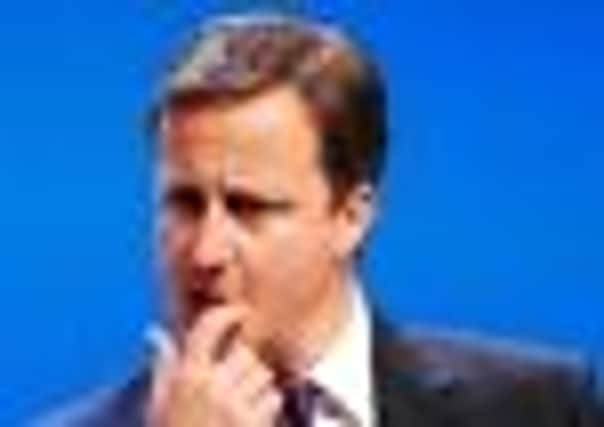Simon Lee: We’re all in this together? Not until Cameron regains trust on donations


The reaction of John Major’s government to that particular scandal in October 1994 was to create the independent Committee on Standards in Public Life.
Since then, the Committee has worked to uphold its seven principles of public life: selflessness, integrity, objectivity, accountability, openness, honesty, and leadership.
Advertisement
Hide AdAdvertisement
Hide AdHowever, the story of public life since October 1994 has been one punctuated by a series of cash-driven scandals which have exposed some serious failings in the British system of party financing and parliamentary lobbying.
Lest we forget, it was David Cameron himself who in February 2010 warned that the British political system was one in which “too much power is concentrated in the hands of the elite and denied to the man and woman on the street”.
Cameron warned that lobbying was “the next big scandal waiting to happen” and that it had “tainted our politics for too long, an issue that exposes the far-too-cosy relationship between politics, government, business and money”. The Conservative Party “must be the party that sorts it all out”.
Cameron was adamant: “We’ve got to fix our broken politics and we’ve got to start fixing it now.”
Those words have now returned to haunt the Prime Minister.
Advertisement
Hide AdAdvertisement
Hide AdThe weekend’s revelations about the apparent ability of rich individuals to buy access to Cameron as Prime Minister, and to exercise undue influence upon the conduct of policy at the very heart of government, are potentially toxic for two reasons.
First, they have the potential to combine with other aspects of coalition policy to reinforce a particular and negative impression among the electorate about David Cameron and the Cabinet of millionaires he leads.
Second, the whole affair, and in particular Cameron’s initial refusal and then subsequent willingness to publish a list of those with whom he has shared private dinners at the flat at Number 10, raises the very same questions about the Tory leader’s character and personal judgment that first appeared when he appointed Andy Coulson as director of communications for the Conservative Party in July 2007, and which have arisen because of his failure to end his personal friendship with Rebekah Books.
The events of the past week have served only to strengthen the public perception that Cameron is leading a government which is simply out of touch with the austerity and privations being experienced by millions of voters.
Advertisement
Hide AdAdvertisement
Hide AdLast November, important recommendations to end the big donor culture in the financing of political parties in the United Kingdom were made by the 13th report of the Committee on Standards in Public Life, chaired by Sir Christopher Kelly.
It concluded that the current arrangements for funding political parties were “potentially corruptible and therefore not deserving of trust”. Indeed, they lacked “integrity, in that if not corrupt they are plainly corruptible”.
The arrangements were also found to “rely on a degree of dependency on a small number of individuals or organisations, which is fundamentally unhealthy”, and left “something to be desired in terms of fairness, in that they give parties with more wealthy supporters an advantage over those with fewer”.
To curb this potential for corruption, among its principal recommendations, the Kelly Committee advocated “a cap of £10,000 should be placed on donations to a political party or regulated done from any individual or organisation in any year”. This recommendation should be introduced with immediate effect.
Advertisement
Hide AdAdvertisement
Hide AdThe Kelly Committee also suggested that existing public funding for political parties should be extended by around £23m or 50 pence per elector. This would be a prudent investment in the future of our democracy.
Last week’s Budget statement estimated that the United Kingdom’s nominal national income or Gross Domestic Product will be £1,576bn in 2012-13.
If the taxpayer was to invest an additional £23m in funding our political parties, this would mean that the United Kingdom would be spending £1 in every £68,522 of its income on reducing the risk of corruption at the heart of its democracy.
Those who would argue against both the principle and the cost of extending public funding of political parties in the United Kingdom might consider just two of the recent uses of public money.
Advertisement
Hide AdAdvertisement
Hide AdLast December, the Government found an additional £41m for the opening and closing ceremonies at the forthcoming London Olympics, taking the total sum allocated to these ceremonies to £81m.
Previously, the Brown Government had found £1.162 trillion of taxpayers’ funding to rescue private banks from the consequences of their irresponsible lending.
The Kelly Committee warned that a failure to respond to its recommendations was “unlikely to be acceptable to the electorate, whose lack of trust on this issue is corrosive to the political system as a whole”.
The Prime Minister must now act, and be seen to act decisively, to deliver on his promises to rebuild trust in politics, or else he can abandon any notion that “we’re all in this together”.
Advertisement
Hide AdAdvertisement
Hide Ad*Dr Simon Lee is a senior lecturer in politics at the University of Hull. He is co-editor of The Cameron-Clegg Government: Coalition Politics in an Age of Austerity and is currently writing The State of England: The Nation We’re In.